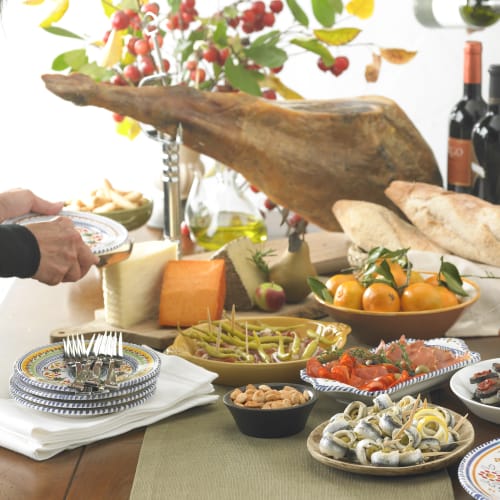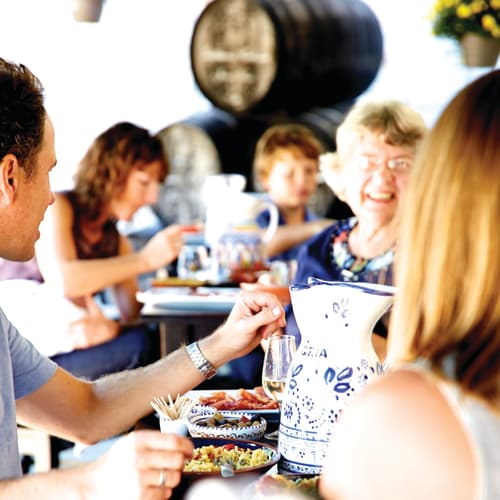Three Kings Sale - Up to 40% Off! Shop Sale
Celebrating and Living Well
Don Harris | December 2015




My La Tienda friends,
This special time of year is set aside for two very important parts of life: the first is the celebration of the harvest. Since the earliest times, the gathering of the fruits of three seasons of labor are marked by a feast. I think of the line from a hymn undoubtedly sung by or forefathers in Plymouth and Jamestown: “All is safely gathered in, ere the winter storms begin.”
The second aspect is spiritual. It is a time when generations of our families, relatives distant and near, come together around a common table.
Of course, times have changed over the centuries. For most of us, our livelihood is not dependent upon picking bushels of potatoes. We are not in the orchards on ladders picking apples, or gently hitting the branches of the olive trees so that our ripe olives will fall into a tarpaulin.

However, the tradition is still in our bones. When we gather around the Thanksgiving or Christmas table covered with the bounty of the harvest - homemade apple and pumpkin pies, our oven yielding our versions of ham and turkey - we are linked to our forefathers who created these traditions centuries ago.
Maybe our grandparents or great grandparents recall other days, sharing memories of life on the farm or other tales of the harvest. Good food is often foremost in our minds as we gather, but not far beyond, are thoughts of longevity and health. By our eating well and living well, we expect we can experience longer and more fruitful lives.
This brings to mind the Mediterranean Diet or way of life - particularly as I read articles with pictures of old and contented people in rural Spain, Italy and Greece. Studies showing the powerful health benefits of this lifestyle are encouraging us all to eat better as we seek to emulate those long-lived and apparently contented people.
In our home, Ruth and I eat fresh Clementine oranges and grapefruits. Our leafy romaine salads are dressed with extra virgin olive oil from our friends in Spain along with tangy sherry vinegar. Now and then, we top it with tuna from Cantabria in Northern Spain. Ruth and I are not zealous in our conformity to the rigors of the Mediterranean diet, and I am sure we would be chided by many for consuming tortilla or potato chips, or too many carbohydrates along with the Manchego cheese and yogurt. But never mind, in the 21st century the food police will always be with us.
However there is certainly truth in the general framework of the Mediterranean diet. And we are pleased that La Tienda can bring some of this bounty of Spain to your table. Over the years, we have learned more of what makes up the best of Spain’s food, and we have gotten to know the Spanish families who produce it.
But you are more than you eat. You may consume the recommended foods such as fresh fish, or fry your egg in olive oil rather than in bacon grease. However this does not make you a better person – nor does it necessarily extend your life.
Here is the companion piece to eating a Mediterranean diet: the spiritual is paired with the physical. If you carefully read the studies, you will find there is another essential ingredient for the long lives of those we seek to emulate: It is their pace of living, their involvement with their neighbors and their close family ties.
In their way of life, a siesta is not an indulgence of the rich or lazy, it is a part of healthy living - and that should be of no surprise. Even when you are working in an office or a factory, you will notice there is a definite down time for your body in the mid-afternoon. Our economy ignores it, and actually forbids taking significant down time because it is not viewed as productive – even though "running on empty" can result in heart attack, depression and reduced quality of the work we do!
One time, perhaps thirty years ago, I first visited Medina Sidonia, an ancient Andalucian mountain town with Moorish roots. I was a student at a Gadir Spanish Language school in Cadiz and went with a fellow student - a youngish rural dentist from England - for an excursion. As we walked into the main plaza of Medina Sidonia, we noticed a large hall in the corner which was filled with older retired men, jubilados, playing dominos – it seemed they were playing by the hour!
At the time I was younger and more foolish and thought how sad it was that they were whiling their life away spending hours doing something so inconsequential as playing dominoes. It seemed to me to be kind of a dumb game. I did not realize that they were enacting the secret of Mediterranean longevity of life. They were paying attention to their bodily rhythms and pausing during the heat of the day, and equally important, they were doing this in community.
They were not just dozing at home in an armchair; they were with their neighbors – many of them lifelong friends. The daily rhythm of their lives included physical nourishment provided by a healthy diet, and it was paired with the spiritual nourishment of spending time with friends. My British dentist friend thought the behavior of these men was very curious so, uninvited, she went into the midst of them to liven them up. Of course, they saw her as the curiosity, not themselves.
One way of thinking of the healthy Mediterranean way of life is in terms of a three legged stool, where each leg is only useful when balanced with the other two. The first involves healthy eating and physical activity. The second involves being a part of a stable ongoing group – whether we are playing dominoes in the Plaza Mayor, playing poker with buddies or cards with friends. It may be participating in a book club or a singing group, or a Bible study or being a member of a congregation. In essence, I am talking about seeking companions who care about one another, and who care for one another. We are talking about love.

Now we come to the third element: it is the family. Ruth and I just had a young man from Sevilla spend the weekend with us. Jaime is a student attending an American university and he has traveled extensively in America. He told us of his visits to New York, Washington, Chicago and Miami. Next on his list are Houston, New Orleans and California. He will have over a month off during the school’s Christmas break, so we asked him what his travel plans were.
He was amazed that we even posed the question. “Of course I’m going home to Spain for Christmas, where else would one want to be? Our house will be filled with uncles and aunts, grandparents and lots of cousins. We will have a wonderful time visiting with one another.” He went on to say, “Isn’t that what families are all about – a chance to be with everyone you have known all your life? I can’t think of any other place I would want to be.”
One of the most appealing aspects of the Spanish culture is the prevailing attitude of sharing in a common life. It provides integrity to their way of life, for their communal approach is what keeps them centered. Traditional Spaniards view their extended family – all the uncles, aunts, and cousins - as their lifeblood, their identity. But it goes beyond this; their neighborhood is included as part of their family in a broader sense.
In modern America, this is hard to accomplish because we move so much and our families are scattered across the country. We have a friend in Williamsburg who has to fly to Fairbanks, Alaska, to see her grandchildren for a few days once a year. Many of us encourage our children to go to college far away from home, or to join the military service for a period of adventure. It might be part of our culture of the frontier – looking for new places, a new excitement and a new start in life.
This is why in the United States our Thanksgiving Day is such a revered event. People flood the interstate highways, airports and train stations to go home even if it is just for a day. Our young guest Jaime commented that his family gathering is a weekly event - every Sunday of the year the whole family comes together.
Of course, we in America cannot replicate the physical continuity of these families whose roots are deep, and who have lived hundreds of years in the same location. Nevertheless, I think we as a nation realize the importance of renewing our family ties. It would be very unusual if you were equally fond of every sibling or cousin, but your family is your bedrock.
At the family table may we be able to experience the kindness extended by a friend or family member as we are celebrating together. As we survey this troubled world in this holy season and see hundreds of thousands innocent people who simply want to flee from an environment of hate, may we be swift to be kind and to take care of one another. Love conquers fear.
¡Feliz Navidad!
Tu amigo,
Don

